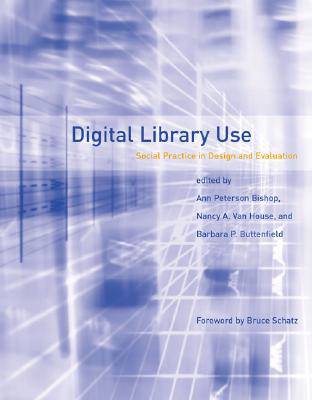
- Afhalen na 1 uur in een winkel met voorraad
- Gratis thuislevering in België
- Ruim aanbod met 7 miljoen producten
- Afhalen na 1 uur in een winkel met voorraad
- Gratis thuislevering in België
- Ruim aanbod met 7 miljoen producten
Digital Library Use
Social Practice in Design and Evaluation
Takeo Pfeil Hoshi, Ann Peterson Bishop, Nancy a Van House, Barbara P ButtenfieldOmschrijving
The contributors to this volume view digital libraries (DLs) from a social as well as technological perspective. They see DLs as sociotechnical systems, networks of technology, information artifacts, and people and practices interacting with the larger world of work and society. As Bruce Schatz observes in his foreword, for a digital library to be useful, the users, the documents, and the information system must be in harmony.The contributors begin by asking how we evaluate DLs -- how we can understand them in order to build better DLs -- but they move beyond these basic concerns to explore how DLs make a difference in people's lives and their social worlds, and what studying DLs might tell us about information, knowledge, and social and cognitive processes. The chapters, using both empirical and analytical methods, examine the social impact of DLs and also the web of social and material relations in which DLs are embedded; these far-ranging social worlds include such disparate groups as community activists, environmental researchers, middle-school children, and computer system designers.Topics considered include documents and society; the real boundaries of a "library without walls"; the ecologies of digital libraries; usability and evaluation; information and institutional change; transparency as a product of the convergence of social practices and information artifacts; and collaborative knowledge construction in digital libraries.
Specificaties
Betrokkenen
- Auteur(s):
- Uitgeverij:
Inhoud
- Aantal bladzijden:
- 352
- Taal:
- Engels
- Reeks:
Eigenschappen
- Productcode (EAN):
- 9780262025447
- Verschijningsdatum:
- 10/10/2003
- Uitvoering:
- Hardcover
- Formaat:
- Genaaid
- Afmetingen:
- 179 mm x 241 mm
- Gewicht:
- 716 g

Alleen bij Standaard Boekhandel
Beoordelingen
We publiceren alleen reviews die voldoen aan de voorwaarden voor reviews. Bekijk onze voorwaarden voor reviews.












